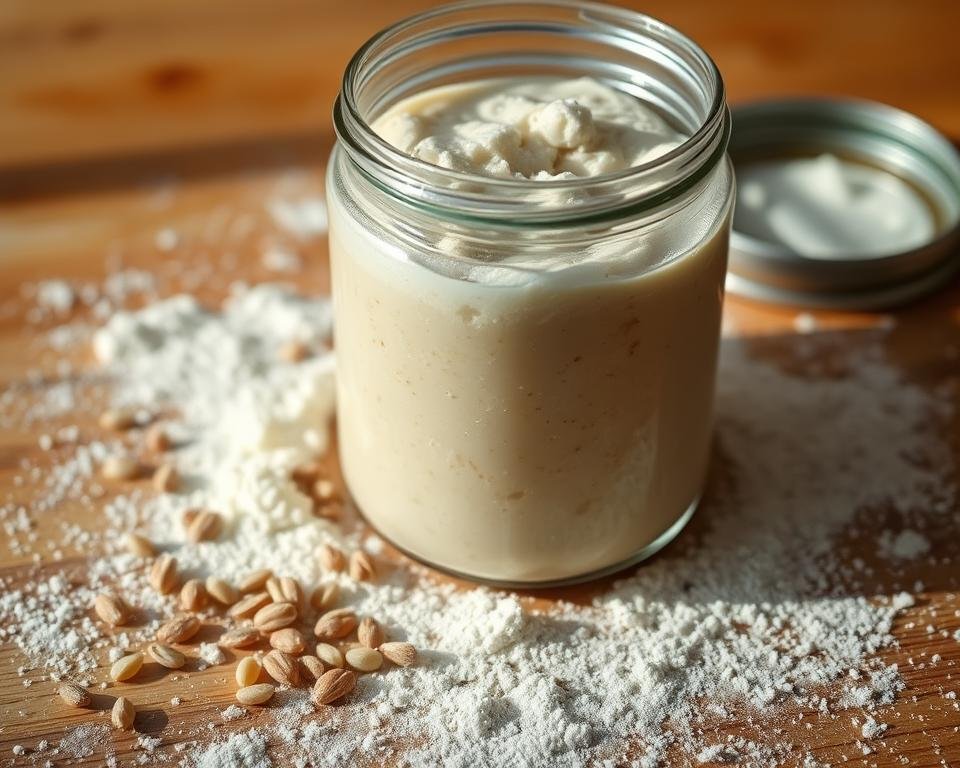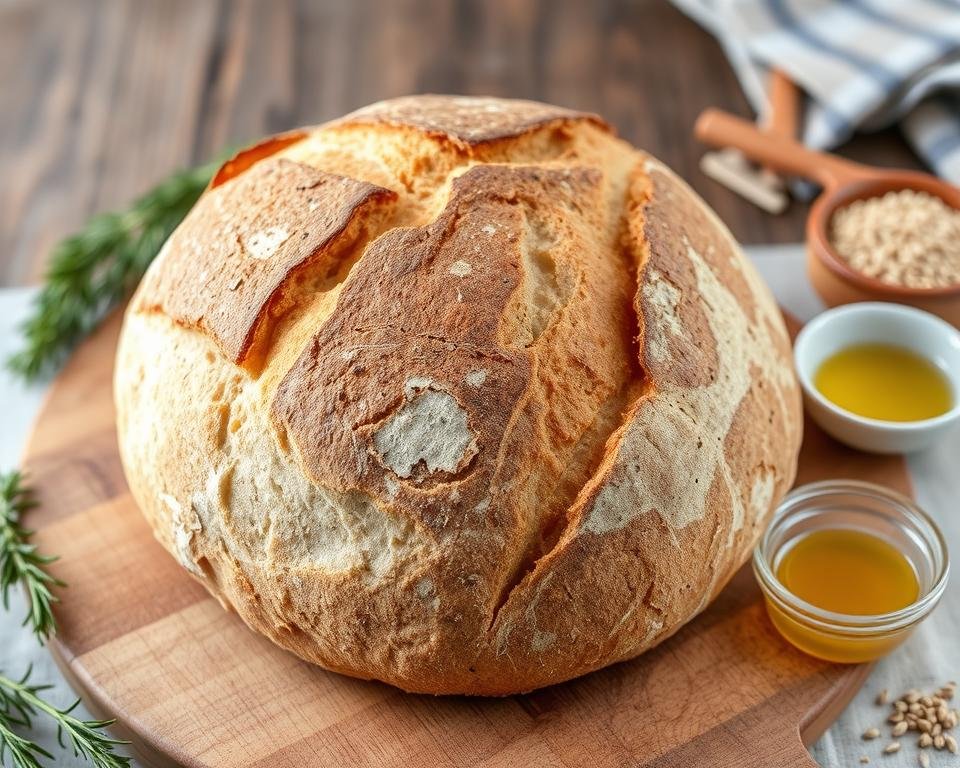“The greatest wealth is health.” – Virgil
The Sardinians, known for their long lives, love sourdough bread. It became super popular during the pandemic. People started making it at home, seeing it as a healthier choice. But is sourdough really a superfood, or just a trend? Experts say sourdough has real health benefits that regular bread doesn’t.
Key Takeaways
- Sourdough bread has a lower glycemic impact, helping to regulate blood sugar levels.
- The fermentation process enhances nutrient bioavailability and breaks down anti-nutrients like phytic acid.
- Sourdough bread is more easily digestible, particularly for those with gluten sensitivities.
- The natural bacteria in sourdough bread can promote gut health and support the immune system.
- Sourdough bread may have a longer shelf life and better resistance to mold due to its acidity.
What is Sourdough Bread?
Sourdough bread is different from regular bread because of its special fermentation process. It uses wild yeast and beneficial bacteria, not commercial yeast. This makes it unique.
Traditional Sourdough Fermentation Process
The fermentation of sourdough bread can take a week or more. Wild yeast and lactic acid bacteria in the starter culture work together. They produce carbon dioxide, which makes the dough rise.
This slow process is what gives sourdough its tangy, complex taste.
Microorganisms Involved in Sourdough Fermentation
The starter culture in sourdough bread has natural microorganisms. These include lactic acid bacteria and acetic acid bacteria. They turn flour’s starches and sugars into carbon dioxide, organic acids, and aromas.
This results in sourdough bread’s unique sour taste. It’s different from bread made with commercial yeast.

Sourdough bread has become more popular for its health benefits. These benefits come from the fermentation process and the microorganisms involved. Knowing about sourdough’s unique qualities can help understand why it might be healthier than white bread.
Sourdough Bread Nutrition Facts
Sourdough bread is a healthier choice than regular bread. A single serving, about 50 grams or one medium slice, has around 130 sourdough bread calories. It also has 4 grams of sourdough bread protein, 1 gram of fat, 25 grams of sourdough bread carbs, and 1 gram of sourdough bread fiber. This serving has less than 1 gram of sugar and 200-300 milligrams of sodium.
Sourdough bread is packed with vitamins and minerals. It’s a good source of B vitamins like vitamin B6, folate, and thiamine. It also has iron, calcium, and magnesium. Plus, it has antioxidants and prebiotics that help your gut health.
| Nutrient | Amount per Serving | % Daily Value |
|---|---|---|
| Calories | 188 | – |
| Carbohydrates | 37 g | – |
| Fiber | 2 g | 7% |
| Protein | 8 g | 16% |
| Fat | 1 g | 2% |
| Selenium | 32% DV | – |
| Folate | 21% DV | – |
| Thiamine | 21% DV | – |
| Niacin | 20% DV | – |
| Riboflavin | 17% DV | – |
| Manganese | 15% DV | – |
| Iron | 13% DV | – |
| Copper | 10% DV | – |
The nutrition in sourdough bread can change based on the recipe and how it’s made. Homemade or artisanal sourdough might have different nutrients than store-bought bread.
Is sourdough bread healthy?
Sourdough bread is a healthier option compared to regular bread. Its unique fermentation process and nutritional profile make it stand out. This slow fermentation unlocks many benefits, making it a top choice for those who care about their health.
Higher Nutrient Content
The fermentation in sourdough bread boosts the availability of important minerals and vitamins. Research shows that sourdough can cut phytate levels by up to 90%. This greatly improves the body’s ability to absorb nutrients like magnesium and phosphorus. So, sourdough is packed with more nutrients than regular bread.
Lower Glycemic Impact
Sourdough bread has a glycemic index of about 55, which is lower than white bread’s 100. This means it raises blood sugar levels more slowly and steadily. It’s a great choice for managing weight and keeping blood sugar levels healthy. The fermentation also breaks down gluten, making it easier to digest for those with gluten sensitivity.
| Bread Type | Glycemic Index |
|---|---|
| White Bread | 100 |
| Sourdough Bread | 55 |
| Corn Tortillas | 49 |
| Nine-Grain Bread | 43 |
| Pumpernickel Bread | 41 |
The combination of higher nutrient content and lower glycemic impact makes sourdough bread a healthier choice. It supports overall well-being and helps with weight management.
Health Benefits of Sourdough Bread
Sourdough bread is not just tasty and made with care. It also has many health benefits. The special way it’s made can make it better than regular bread.
Improved Mineral Bio-availability
One big plus of sourdough bread is how well it lets your body use minerals. The making process breaks down things like phytic acid. This helps your body get more calcium, sodium, zinc, and magnesium from it.
Prebiotic and Gut Health Effects
Sourdough bread is also full of prebiotics. These are fibers that feed the good bacteria in your gut. The making process makes more resistant starches and soluble fiber. These help your gut health a lot.
Also, sourdough’s lower pH helps it last longer. This is because of the acids made during fermentation. It keeps mold away and makes it last longer.
“A 2021 review in the journal Microorganisms stated that the fermentation process for sourdough bread can lead to an increased number of prebiotic- and probiotic-like properties that help improve gut health.”
In short, eating sourdough bread can help your health a lot. It’s good for mineral absorption, gut function, and shelf life. It’s a healthy and tasty choice for better health.
Gluten and Digestibility of Sourdough Bread
Sourdough bread has less gluten than other breads. Gluten is a protein in wheat, barley, and rye. The fermentation process breaks down gluten, making it easier to digest for those with gluten sensitivity or intolerance.
Research shows that sourdough fermentation can change wheat and gluten. This makes the bread easier to digest. People with gluten/wheat intolerance might not react to it.
Using more starter in sourdough bread makes it more digestible. Rye flour is also easier to digest than other gluten flours. It may cause fewer intolerance reactions.
But, sourdough bread is not gluten-free. People with celiac disease or gluten allergy should avoid it. Yet, for those with gluten sensitivity or irritable bowel syndrome (IBS), it might be easier to digest than other breads.
Shelf Life and Mold Resistance
Sourdough bread stands out for its long shelf life and mold resistance. The fermentation process is key. It helps the bread last longer and keeps harmful microorganisms away.
The lactic acid bacteria in sourdough make acids like acetic and lactic. These acids lower the bread’s pH. This makes it hard for mold and harmful bacteria to grow.
Studies show sourdough can stay fresh and mold-free for up to three weeks. This is much longer than regular bread. It proves the power of natural fermentation in keeping bread safe and fresh.
The microbes in sourdough, like Fructilactobacillus sanfranciscensis and Lactobacillus and Saccharomyces species, are important. They make compounds that stop mold. This ecosystem is what makes sourdough bread last longer and resist mold better.
Industrial bread uses synthetic preservatives to last longer. While it works, it’s not as natural as sourdough. Sourdough’s unique qualities make it a healthier, longer-lasting choice for bread lovers.
Choosing a Healthy Sourdough Bread
When picking a healthy sourdough bread, choose whole grain options. These breads have more fiber, protein, and nutrients. They also have a lower impact on blood sugar levels than refined breads.
Whole Grain Varieties
For the best health benefits, go for sourdough made with whole wheat, spelt, or rye flour. These breads are packed with B vitamins, iron, and magnesium. They also have more fiber, which helps you feel full longer.
Stay away from sourdoughs with all-purpose flour or refined grains as the main ingredients. While they’re better than white bread, they don’t match the nutritional value of whole-grain sourdoughs.
Check the ingredient list for minimal added sugars and sodium. Longer fermentation times mean lower blood sugar spikes. So, pick loaves that have fermented for at least 12-24 hours.
Choosing whole grain sourdough bread gives you a tasty, healthy, and gut-friendly option. It’s great for your overall health.
Conclusion
Sourdough bread is a healthier choice than regular bread. It has a unique fermentation process and is packed with nutrients. Sourdough bread has a lower glycemic impact and is easier to digest. It also supports gut health.
Even though it’s not gluten-free, sourdough might be easier for those with gluten sensitivities to digest. Its natural preservatives make it last longer. Choosing a whole grain sourdough loaf boosts its health benefits.
Many studies show the benefits of sourdough bread. It has better baking properties and can lower blood sugar and insulin levels. The fermentation process breaks down grain components, making it easier to digest for some.
Sourdough bread also increases the bioavailability of minerals and phytochemicals. This adds to its nutritional value.
While it’s high in carbohydrates, sourdough bread is still a healthier option than many other breads. Adding it to a balanced diet can improve gut health and blood sugar control. It also increases the nutrient density of your meals.
FAQ
Is sourdough bread healthy?
Yes, sourdough bread is a healthier choice. It has a lower glycemic index and more nutrients than white bread.
What makes sourdough bread healthier?
The fermentation process makes sourdough healthier. It reduces gluten and boosts nutrients like folate, iron, and magnesium.
How does the nutrition of sourdough compare to regular bread?
Sourdough has less sugar and more fiber than white or wheat bread. It also helps control blood sugar better.
Is sourdough good for weight loss?
Yes, sourdough is better for weight management. Its slow digestion and low glycemic index help.
Are there any downsides to eating sourdough bread?
Sourdough may still have gluten, so it’s not good for those with gluten issues. Eat it in moderation as it’s high in carbs.
How often can I eat sourdough bread?
Eating sourdough can be part of a healthy diet. Experts say to limit it to 2-4 servings a day.
Can I eat sourdough bread if I’m trying to cut carbs?
Yes, sourdough is a better choice for low-carb diets. But remember to control your portions.




Pingback: 2500 Calorie Meal Plan High Protein Guide for Fitness
Pingback: Can Dogs Eat Strawberries: Safe Feeding Guide
Pingback: Best 1000 Calories a Day Dog Food for Weight Control
Pingback: Can Dogs Have Soy Milk: Safe For Your Furry Friend?
Pingback: Best High Calorie Dog Food Supplement Guide
Pingback: Can Dogs Eat Lemons - Pet Food Safety Guide